Cardinal Tagle: Asian Church Needs More Magi and Fewer Herods
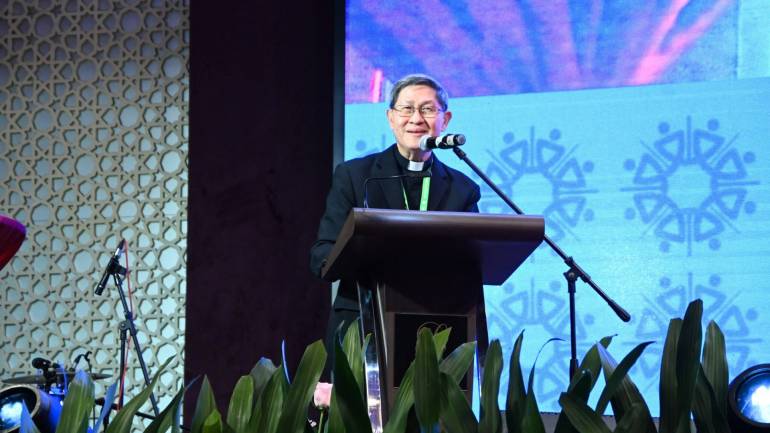
Speaking before more than a thousand delegates from across Asia at the Great Pilgrimage of Hope in Penang, Malaysia, Cardinal Luis Antonio Tagle urged the Church to embrace the spirit of the Magi, pilgrims who seek, listen, and walk with humility, and to reject the attitudes of Herod, who clung to fear, power, and self-preservation.
The Great Pilgrimage of Hope opened on November 27 in Penang, Malaysia, the largest gathering of the Asian Church in twenty years. The event began with an opening ceremony followed by Mass presided over by Cardinal Sebastian Francis, Bishop of Penang, the hosting diocese.
A highlight of the first day was the keynote address delivered by His Eminence Luis Antonio Cardinal Tagle, Pro-Prefect for the Section of First Evangelization of the Dicastery for Evangelization, on the theme “Going a Different Way, Renewed Pilgrims of Hope.”
Christian Hope: A Gift That Purifies and Redirects Life
Cardinal Tagle began with humor and warmth, recalling his experience at the first Congress held in Thailand in 2006. He emphasized that Catholics in Asia must never tire of “telling the story of Jesus”, a story that continues to transform lives, cultures, and communities.
Focusing first on the second part of his theme, “Renewed Pilgrims of Hope,” he clarified what Christian hope truly means. Hope, he stressed, is not optimism, wishful thinking, or an escape from life’s difficulties. Rather, “Christian hope is a theological virtue, infused by God, with God as its origin and its goal.”
Citing the Catechism of the Catholic Church (1818), he explained that hope plants in every human heart the desire for happiness, sustains people in trials, purifies their loves, and directs their aspirations toward the Kingdom of God. True hope strengthens perseverance, purifies selfish motives, and renews charity.
Tagle invited delegates to reflect honestly: What gives me real happiness? What motivates my perseverance? Is my charity truly for God’s Kingdom, or for my own advantage?
“Christian hope,” he said, “purifies our hearts so that the neighbor is loved as God loves.”
Going a Different Way: The Magi and the Pilgrimage of Hope
Turning to the first part of his theme, “Going a Different Way,” Cardinal Tagle reflected on the story of the Magi, who returned home by another route after encountering the child Jesus. Their story, he said, is a model for the peoples of Asia, diverse, searching, and guided by holy yearnings.
He contrasted the Magi with Herod, presenting two kinds of pilgrimages:
• a pilgrimage toward Jesus, guided by humility, openness, and light
• a pilgrimage without Jesus, marked by fear, stagnation, and violence
From the very beginning, the Magi were already taking a “different way.” Though Gentiles, they looked beyond themselves, reading the stars, paying attention to creation, and listening to the echoes of prophecy. Their openness set them on a path of discernment.
Herod, by contrast, “did not move.” His obsession with power blinded him to creation, scripture, and the joy of others. “If you have power,” Tagle said, “you have weight, and if you have weight, it is difficult to move.” Herod’s immobility became “contagious,” infecting even those around him with fear and inaction.
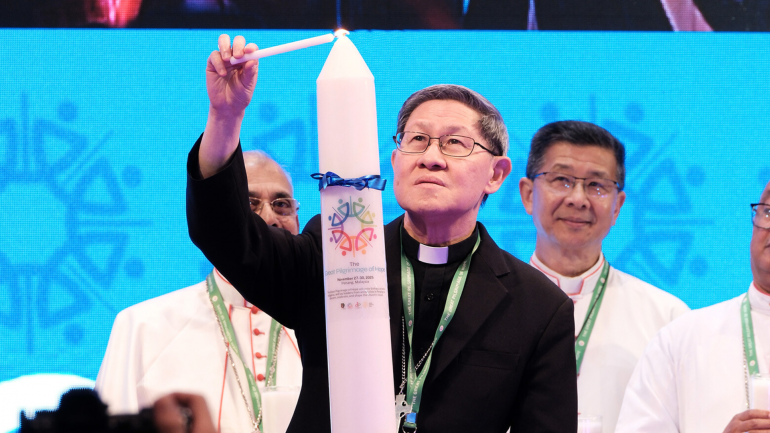
Humility, Synodality, and the Courage to Learn
A second key difference, Tagle noted, is that the Magi accepted their ignorance and asked for help. Their pilgrimage required humility, the willingness to learn from scripture and from the religious leaders of Jerusalem. This humility echoes the spirit of synodality.
Herod and his court, however, possessed knowledge but were unmoved by it. Their expertise served only to protect power, not to lead to truth. Tagle warned against similar stagnation in Church life: “Gifts of the Holy Spirit are wasted when ignored… or when used only for ambition, not for the common good.”
Finding Joy in Bethlehem, Not Jerusalem
A third element Tagle highlighted was the Magi’s prompt response to revelation. Once they learned the prophecy, they moved immediately, following both scripture and the star until they found the child. Their joy overflowed into worship and the offering of gifts “fit for a Messiah who will suffer.”
Herod, meanwhile, was disturbed by the news. Threatened by the birth of a new king in humble Bethlehem rather than royal Jerusalem, he conspired in violence, even against innocent children. “Hopeless people are not joyful,” Tagle warned. “They do not tolerate joy in others.”
He urged delegates, especially clergy and Church leaders, to learn from Bethlehem: “There is much wisdom and joy in the small communities we sometimes overlook.”
“We Need More Magi, Fewer Herods”
In a moving personal anecdote, Cardinal Tagle shared how, during a recent foreign visit, he got lost on his way to a meeting with a head of state. The detour led him instead to two Filipino migrant workers who recognized him, asked for prayers, and shared their struggles. “I realized I did not get lost,” he said. “Jesus led me to that path.”
This, he insisted, is the heart of the Christian pilgrimage: “Jesus takes a different way. He is the way, the truth, and the life. He is our star, our goal, our hope.”
Cardinal Tagle concluded with a strong call to action for the Church in Asia:
“We need more Magi, pilgrims who seek, listen, learn, and adore.
We need fewer Herods, those trapped in fear, power, and despair.
Come and join Jesus’ pilgrimage.”
Radio Veritas Asia (RVA), a media platform of the Catholic Church, aims to share Christ. RVA started in 1969 as a continental Catholic radio station to serve Asian countries in their respective local language, thus earning the tag “the Voice of Asian Christianity.” Responding to the emerging context, RVA embraced media platforms to connect with the global Asian audience via its 21 language websites and various social media platforms.










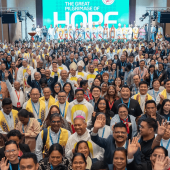
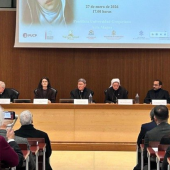
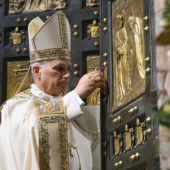
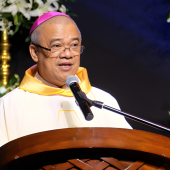
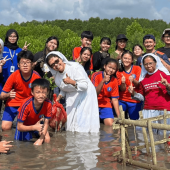
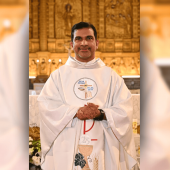
- Reply
Permalink